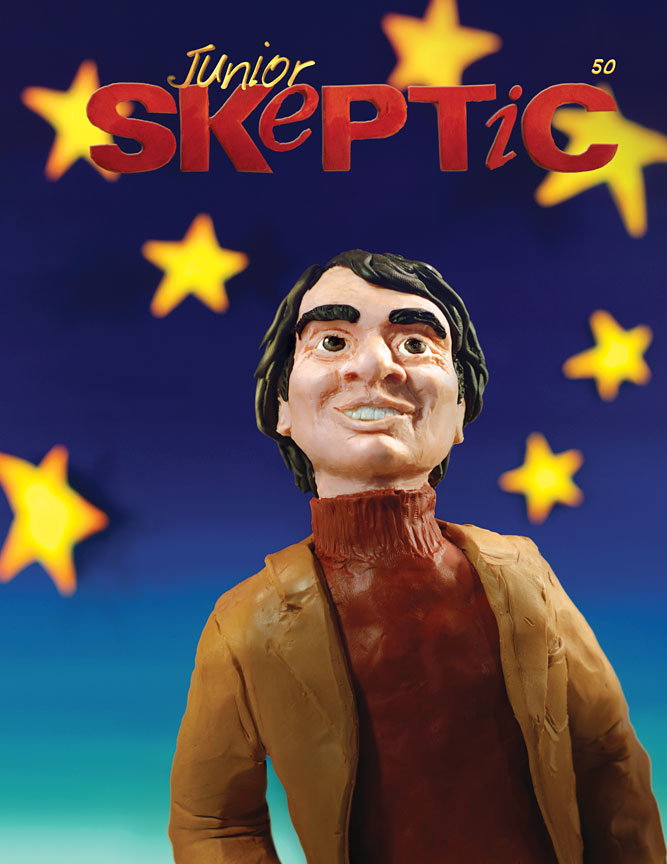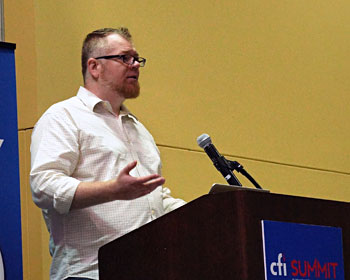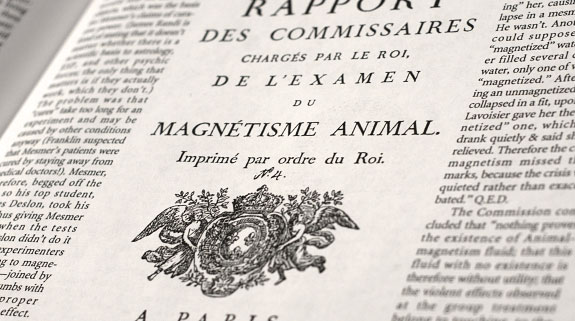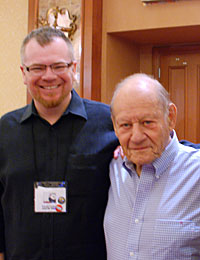by
Daniel Loxton, Mar 09 2014

With the world of popular science nerdery (my world!) on fire with excitement for tonight’s premiere of the new television miniseries Cosmos: A Spacetime Odyssey, I thought I might share a small excerpt from Junior Skeptic 50—our special celebratory look back at the life and legacy of Carl Sagan. You can find this short, kid-friendly biography of one of skeptical history’s most inspiring figures bound inside Skeptic Vol. 19, No. 1, which ships shortly. Subscribe to Skeptic today in digital or print formats!
For age-appropriate simplicity, the format of Junior Skeptic does not include endnotes (though I often call out important sources in sidebars or in the text of the story itself). Here, for your interest, I’ve included some relevant citation endnotes from my research: Continue reading…
comments (2)
by
Daniel Loxton, Dec 03 2013
 I recently had the pleasure of representing the Skeptics Society as a guest of the CFI Summit conference in Tacoma, Washington, hosted jointly by the Center for Inquiry, the Committee for Skeptical Inquiry, and the Council for Secular Humanism. I was invited to contribute a 20-minute talk as part of the October 25, 2013 opening panel on the topic “Humanism and Skepticism: Separate or Joint Agendas?” with Ron Lindsay, Barry Kosmin, Ophelia Benson, Mark Hatcher, Ray Hyman, and Michael De Dora. Most of the panel argued that these two traditions either overlap very extensively, or can be usefully packaged together. As expected, Ray Hyman and I were the exceptions.
I recently had the pleasure of representing the Skeptics Society as a guest of the CFI Summit conference in Tacoma, Washington, hosted jointly by the Center for Inquiry, the Committee for Skeptical Inquiry, and the Council for Secular Humanism. I was invited to contribute a 20-minute talk as part of the October 25, 2013 opening panel on the topic “Humanism and Skepticism: Separate or Joint Agendas?” with Ron Lindsay, Barry Kosmin, Ophelia Benson, Mark Hatcher, Ray Hyman, and Michael De Dora. Most of the panel argued that these two traditions either overlap very extensively, or can be usefully packaged together. As expected, Ray Hyman and I were the exceptions.
As a frequent critic of conflation between skepticism and parallel rationalist movements, I was asked to revisit some of my arguments regarding skepticism’s distinctiveness. Regular readers will recognize that the central portion of my speech was adapted from my two-chapter historical exploration “Why Is There a Skeptical Movement?” (PDF)—notably from a section which I have previously posted as a standalone blog post. Nonetheless, there is also much here which I have not said publicly in the past.
I present my remarks here essentially as they were delivered:

Daniel Loxton delivers his talk at the CFI Summit 2013 conference in Tacoma. Both this image and the panel photograph at the top of the page are by Brian D. Engler (used with permission)
I’d like to thank the folks here at the Center for Inquiry for inviting me to join you here today.
I work for Pat Linse and Michael Shermer over at the Skeptics Society, so in some sense I’m an outsider here. And yet I feel intimately connected to the history and work and people—connected to both of the distinct traditions—that are represented at this event.
Continue reading…
Comments Off
by
Daniel Loxton, Aug 22 2013
Today I’d like to share a slightly adapted version of my introduction to the “Preserving Skeptical History” workshop at The Amazing Meeting 2013 conference in Las Vegas. After the pleasure of introducing a distinguished panel (including Today in Skeptic History app creator Tim Farley, Guerrilla Skepticism on Wikipedia project organizer Susan Gerbic, 36-year veteran Skeptical Inquirer columnist Robert Sheaffer, and psychologist and CSICOP co-founder Ray Hyman) I took the liberty of opening the discussion with some conceptual remarks:

A classic science-based skeptical investigation of a paranormal claim, translated into English for the first time in Skeptic magazine
Does History Matter?
Should “scientific skeptics” care about history? You’ve chosen to attend a workshop with the dusty title “Preserving Skeptical History,” so I imagine you have opinions on this yourself. But you’d be surprised how often this question comes up.
It really breaks down to two different questions:
Should skeptics care about studying or preserving or exploring our own history?
And, to what extent should skeptics devote resources and time and attention to the study of the history of claims and hoaxes?
Continue reading…
comments (6)
by
Daniel Loxton, Aug 19 2013
Advocating for the importance of skeptical scholarship is a bit of a theme for me—the scholarship practiced by skeptics, and also scholarship about skepticism. In particular, I’ve devoted quite a bit of attention to the exploration of the history of (“scientific”) skepticism. Especially over the past couple of years, historical reflection has become a larger ongoing concern that unifies much of my work.
With that in mind, I thought it might be useful to start a post here in which I can collect, list, and link to some of my work relating to the history of skepticism. The idea is that I can return to update this post with new links as time goes by.
Continue reading…
comments (1)
by
Daniel Loxton, May 07 2013
This week I’d like to share something a little different: an out-of-copyright detective story published way back in 1916. “The Rough Fist of Reason”—one of the “Strange Cases of Magnum, Scientific Consultant” by Max Rittenberg (1880–1965)—tells the tale of a fictional on-site skeptical investigation into the operation of a slick Spiritualist medium and a perplexing photograph of an astral manifestation. It is charmingly dated and over the top, and yet it is also astonishingly familiar. It echoes not only much of the language and arguments of the modern skeptical movement, but also some of the clichés and ongoing debates of our field. Like some modern portrayals of skeptics in fiction (I’m reminded here of Hugh Laurie’s Dr. House or Benedict Cumberbatch’s Sherlock Holmes) Magnum is a hard, overconfident debunker with little empathy for the purveyors or consumers of paranormal ideas: “He was an inveterate opponent of superstition or nebulous fancy presented to the world in the garments of science, and wherever possible, liked to smash a fist into it.” In his merciless materialism, he is both brilliant and callous; admirable, and yet conceivably dangerous to the wellbeing of those he encounters.
Continue reading…
comments (9)
by
Daniel Loxton, Dec 11 2012
Growing up in a family of silvicultural contractors, much of my parents’ dinner table conversation revolved around the low bid system, which made the treeplanting industry a deeply exasperating, boom-and-bust roller-coaster. The challenge was how to work out bids which would cover the costs of the work and allow us to keep a roof over our heads through the winter, while also somehow outbidding people who didn’t know how to do that. Maddeningly, startup treeplanting companies were constantly jumping in with an incomplete appreciation of the complexity and risks (and therefore true costs) of running large contracts. The inexperienced routinely underbid the experienced—leaving us hungry—and then went promptly out of business. So I grew up with the lesson that things are always more complicated than they look at first glance—a lesson my work in skepticism has never failed to confirm.
At art school, I learned another lesson no less applicable to understanding paranormal and fringe claims: originality isn’t really a thing. Too many people have been sharing ideas for too long to support the conceit that our own ideas offer much in the way of substantial novelty.
I’m reminded of both lessons right now, as my research takes me a little deeper into skeptical history. Case in point: the well known and often repeated skeptical slogan, “Extraordinary claims demand extraordinary evidence.”
Continue reading…
comments (18)
by
Daniel Loxton, Sep 05 2012

Daniel Loxton poses with Paul Kurtz at The Amazing Meeting 8 conference
In
my previous post, I quoted from a 1988
Skeptical Inquirer article written by philosopher Paul Kurtz, a founder of the first successful North American skeptics group (the Committee for the Scientific Investigation of Claims of the Paranormal, or CSICOP—now called CSI). There’s nothing I find more
inspiring than rediscovering the older skeptical literature. Copies of the journal-format
Skeptical Inquirer of the 1970s-80s are especially valuable for historical perspective. (I have most of these in my research library, but also now benefit from the very affordable and
searchable DVD collection.)
Reading that 1988 Kurtz article, a passage leapt out at me for its similarity to something I wrote 19 years later. First, here are some lines from the end of my 2007 manifesto essay “Where Do We Go From Here?” (PDF) (a manifesto written partly in response to arguments Paul Kurtz was then making about widening the scope of skepticism away from our traditional mandate of critical, science-based evaluation of paranormal claims.1 I argued that we should instead re-focus on testable paranormal and pseudoscientific claims, despite the exhaustion skeptics sometimes feel at the endlessness of that task):
Continue reading…
comments (12)


 I recently had the pleasure of representing the
I recently had the pleasure of representing the 

